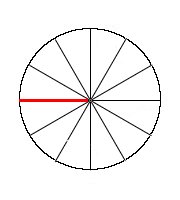The Ascendant in Traditional Astrology
by Helen Beers
Smiling Sky Astrology

The literal meaning of the word horoscope is "hour-marker." Traditionally, it was neither the term for the whole astrological chart nor the name for short sun-sign forecasts as it’s become. Instead, it was the name given to any of a number of astrological points capable of signifying, amongst other things, the beginning of life for a human. As such they mark the boundary, or cusp, of the first house, which is the house of life. The hour-marker I’ll look at here is the ascendant.
The common understanding in modern astrology is that the ascendant (which is the degree of the zodiac rising over the eastern horizon at the moment of a person’s birth) expresses an individual’s automatic, unmediated response to their social environment. But traditional astrology is less about psychology and more connected to the religious concepts which allowed astrology to develop in the first place. The ancient view was that life on earth reflected the will of the gods in their heavens. This meant that the birth chart, as a record of the constellations and planets at the time of birth, described an individual’s entanglement with fate. In other words, the ascendant, as the point where a human begins his/her material existence, is a point of great significance and destiny.
It’s believed that the ancient Egyptians first developed horoscopic astrology. They divided the skies into constellations, and thirty-six of the most important which fell along the ecliptic (the apparent path of the sun around the earth) were used to mark the march of time. These were the decans. Specific religious rituals would be timed to be performed during the times of certain decans and this meant that, by association, each carried particular symbolic significance.
Other observations were that the rising and setting of significant stars coincided with major earthly events. For instance, the annual flooding of the Nile was associated with Sirius’ heliacal rising (a celestial body’s heliacal rising is the first time it’s visible just ahead of the sunrise). The understanding that evolved from these ideas was that the rising degree had special predictive significance.
In the ancient world, the celestial zodiac was the causal world. In other words, the planets and stars brought about effects, although not up in the skies. Nothing happened there because it was not the realm of action. Instead, the celestial bodies caused material events on earth. In this way of thinking, the ascendant marks the hour, fixes the houses and determines the roles of the signs in relation to that point. Put another way, the ascendant acts as a pin holding the otherwise revolving zodiac at a certain point. This symbolic freezing of the movement of the heavens provides the events symbolised by the birth chart with their context.
Besides marking an individual’s birth and acting as a marker for the whole chart, the ascendant is, as I’ve said, the cusp of the first house. This means that the planets connected to it by rulership and/or placement signify the physical looks and health of the individual, his/her will to live, childhood, character and intelligence. It is also presently said that the zodiacal sign of an individual’s ascendant describes their social mask. For instance, someone with an Aries ascendant will be forthright and competitive because Mars rules that sign. But this isn’t necessarily so.
First, if Mars rules the ascendant but is in a sign very different from his essential nature (such as Libra), the individual may not face the world in a typically Arian way. Second, the ruler of an Aries ascendant won’t necessarily be Mars. This may be the sun since in some of Aries’ degrees he’s the strongest planet or, in other words, has more essential dignity than Mars. This means that some individuals with Aries ascendants are probably very Leo in their approach to the world. Third, any planet rising close to the ascendant may describe the personality better than the ascendant ruler or "Lord of the Geniture" as he’s also known.
Therefore, although the ascendant certainly describes an individual’s character and offers a wealth of psychological information, it has much more to say besides.
This article copyright © 2013 Helen Beers. All rights reserved. Reproduction without permission prohibited.
Legal Info | Privacy Policy | Site Map | Home Page


